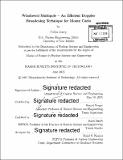| dc.contributor.advisor | Benoit Forget. | en_US |
| dc.contributor.author | Josey, Colin | en_US |
| dc.contributor.other | Massachusetts Institute of Technology. Department of Nuclear Science and Engineering. | en_US |
| dc.date.accessioned | 2016-07-18T20:03:10Z | |
| dc.date.available | 2016-07-18T20:03:10Z | |
| dc.date.copyright | 2015 | en_US |
| dc.date.issued | 2015 | en_US |
| dc.identifier.uri | http://hdl.handle.net/1721.1/103708 | |
| dc.description | Thesis: S.M., Massachusetts Institute of Technology, Department of Nuclear Science and Engineering, 2015. | en_US |
| dc.description | Cataloged from PDF version of thesis. | en_US |
| dc.description | Includes bibliographical references (pages 69-71). | en_US |
| dc.description.abstract | In this thesis, the windowed multipole method of Doppler broadening is developed from the multipole method. The multipole method is a pole and residue reformulation of the cross section data used in nuclear cross section data libraries. This form is advantageous as the Doppler broadened form is analytical, and the library itself is very small. However, multipole is quite slow. By introducing a slight approximation to the data, however, the computational cost can be reduced substantially. The method used to do this is called the windowed multipole method. The conversion of a multipole library to a windowed multipole library is detailed thoroughly. Then, a windowed multipole library is developed and tested on a light water reactor benchmark. In testing, the library outperformed target motion sampling and pseudomaterials in computational time, memory usage, and cache efficiency. Windowed multipole had a factor of 33 fewer cache misses than target motion sampling, and a factor of 80 fewer than pseudomaterials. This reduction in memory transfers makes it a very suitable on-the-fly Doppler broadening algorithm for Monte Carlo simulations on future supercomputer designs. | en_US |
| dc.description.statementofresponsibility | by Colin Josey. | en_US |
| dc.format.extent | 71 pages | en_US |
| dc.language.iso | eng | en_US |
| dc.publisher | Massachusetts Institute of Technology | en_US |
| dc.rights | M.I.T. theses are protected by copyright. They may be viewed from this source for any purpose, but reproduction or distribution in any format is prohibited without written permission. See provided URL for inquiries about permission. | en_US |
| dc.rights.uri | http://dspace.mit.edu/handle/1721.1/7582 | en_US |
| dc.subject | Nuclear Science and Engineering. | en_US |
| dc.title | Windowed multipole : an efficient Doppler broadening technique for Monte Carlo | en_US |
| dc.title.alternative | Efficient Doppler broadening technique for Monte Carlo | en_US |
| dc.type | Thesis | en_US |
| dc.description.degree | S.M. | en_US |
| dc.contributor.department | Massachusetts Institute of Technology. Department of Nuclear Science and Engineering | |
| dc.identifier.oclc | 953254829 | en_US |
